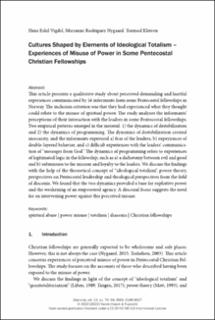Cultures shaped by elements of ideological totalism – Experiences of misuse of power in some pentecostal christian fellowships
Peer reviewed, Journal article
Published version
Permanent lenke
https://hdl.handle.net/11250/3115184Utgivelsesdato
2023Metadata
Vis full innførselSamlinger
- Artikler / Articles [1185]
- Publikasjoner fra CRIStin [1132]
Originalversjon
Diaconia. Journal for the Study of Christian Social Practice. 2023, 13 (1), 70-94 10.13109/diac.2022.13.1.70Sammendrag
This article presents a qualitative study about perceived demanding and hurtful experiences communicated by 16 informants from some Pentecostal fellowships in Norway. The inclusion criterion was that they had experienced what they thought could relate to the misuse of spiritual power. The study analyzes the informants’ perceptions of their interaction with the leaders in some Pentecostal fellowships. Two empirical patterns emerged in the material: 1) the dynamics of destabilization and 2) the dynamics of programming. The dynamics of destabilization created insecurity, and the informants expressed a) fear of the leaders, b) experiences of double-layered behavior, and c) difficult experiences with the leaders’ communication of “messages from God.” The dynamics of programming refers to experiences of legitimated logic in the fellowship, such as a) a dichotomy between evil and good and b) submission to the mission and loyalty to the leaders. We discuss the findings with the help of the theoretical concept of “ideological totalism”, power theory, perspectives on Pentecostal leadership and theological perspectives from the field of diaconia. We found that the two dynamics provided a base for exploitive power and the weakening of an empowered agency. A diaconal focus suggests the need for an intervening power against this perceived misuse.
Beskrivelse
Open access publication licensed under a CC-BY-NC-ND 4.0 International License

